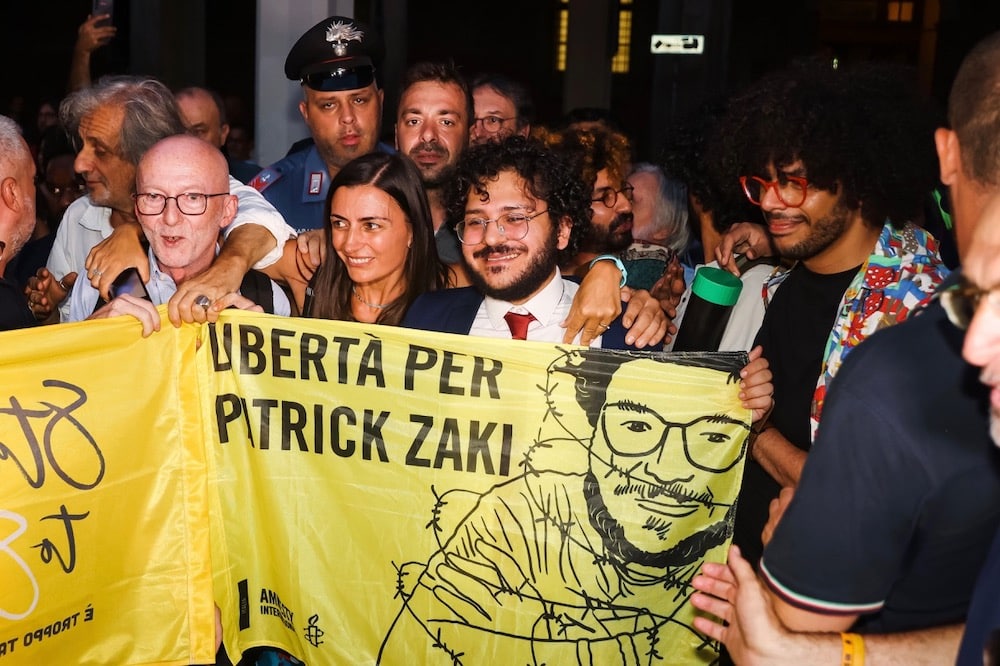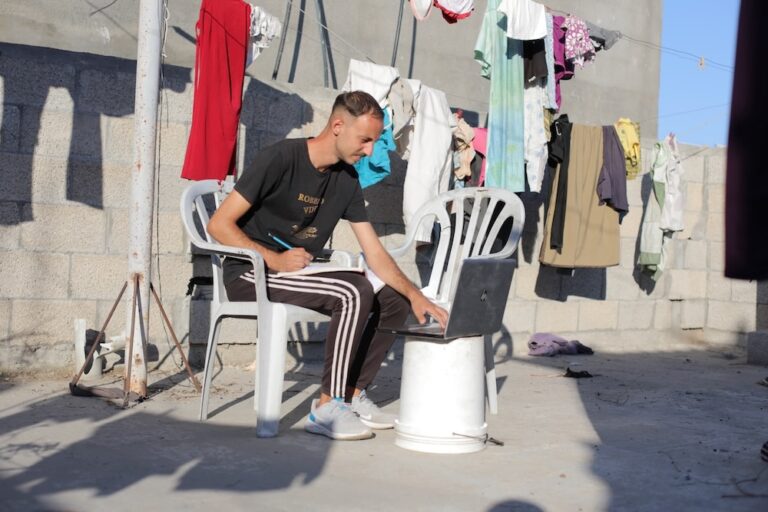July 2023 in MENA: A free expression round up produced by IFEX’s Regional Editor Naseem Tarawnah, based on IFEX member reports and news from the region.
New laws curtail online expression in Jordan and Iraq. Journalist’s sentencing sets alarming legal precedent in Lebanon. Holding Egypt and Tunisia accountable for dire human rights abuses.
Cybercrimes, censorship, and transnational persecution in Jordan
Jordan’s parliament passed a new severe cybercrime law last month, despite considerable opposition from civil society. The Arab Alliance for Digital Rights, a network of regional rights organisations aiming to safeguard online freedoms, expressed concern over the law’s use of broad and ill-defined terminology in several clauses that allow authorities to penalize individuals for exercising their right to free expression.
Journalists and activists accused of spreading “false news”, or posting anything that causes “damage to reputation”, “inciting morality”, or “undermining national unity” will face heavy penalties and up to three years in prison. Administrators are also responsible for comments posted by others on their websites and social media pages, effectively rendering them censors.
Provisions in the new law would also grant authorities the power to block websites and social media platforms from the national network for failing to comply with content removal requests, and require social media companies with over 100,000 users to open physical offices in the country to comply with such requests.
“Given that Jordan’s judicial system lacks independence and is frequently used to prosecute human rights defenders, activists, journalists, and political opponents, this law offers a dark prospect of Jordan’s civic space.” — Arab Alliance for Digital Rights
The new law, which is still awaiting final approval from the king, is part of a larger trend in which authorities are cracking down on online free expression and access to information from inside and outside of the country. In December, authorities banned TikTok following the live-streaming of a protest on the platform. Last month, the satirical news site Al-Hudood was also blocked without explanation.
According to Al-Hudood’s co-founder Isam Uraiqat, the blocking is most likely related to a recent article satirizing a government campaign promoting a royal wedding. IFEX member International Press Institute (IPI) called the censorship “a worrying sign about freedom of expression and media freedom”, and urged authorities to refrain from actions that threaten the public’s right to access information.
Meanwhile, Jordanian activists in exile have also been reportedly targeted by Jordanian security authorities in what rights groups say is part of a rising trend in the country’s transnational repression. An investigation by Democracy for the Arab World Now (DAWN) in June documented several cases of activists abroad that have been targeted with extraterritorial harassment, including attempts to bribe them with money or jobs, threaten prosecution based on bogus charges, and retaliate against family members still residing in the country.
Echoing repression: Iraq rekindles restrictive legislation
Taking a page from Jordan’s playbook on stifling online expression, neighbouring Iraq saw the government re-introduce its own contentious cybercrime bill last month. The proposed repressive legislation would further crack down on the country’s online civic space by providing authorities a legal tool to arbitrarily prosecute anyone undermining the ill-defined “country’s supreme economic, political, military, or security interests”. Violators of such a crime could face life in prison and a fine of up to 50 million Iraqi Dinars ($38,000 USD), while insulting a religious ritual or symbol could lead to a 10 year sentence and a 10 million Iraqi Dinars ($7,600 USD) fine.
In tandem with the cybercrime bill, the government re-introduced amendments to a proposed law concerning freedom of expression and assembly that prosecutes public comments that transgress even more ambiguously defined terms like “public morals” and “public order”.
With lawmaker discussions about the amendments to both laws held privately, Amnesty International and the Iraqi Network for Social Media (INSM) voiced concerns over access to public information about the proposed amendments, as well as civil society inclusion ahead of the vote.
“It is unacceptable that in Iraq today we are suffering from a lack of access to information on draft laws under consideration by parliament. Access to information is an inherent human right and it is one of the keys to the rule of law.” — INSM executive director, Hayder Hamzoz
A dangerous legal precedent; LGTBQI+ community targeted in Lebanon
Last month, Lebanese TV presenter Dima Sadek was sentenced to one-year imprisonment on charges of “defamation, slander as well as inciting sectarian strife” in a verdict over a lawsuit filed by the Free Patriotic Movement (FPM) political party and its leader Gebran Bassil in 2020. The complaint against Sadek came after she posted a widely-shared video of a sectarian attack led by FPM party members, which the journalist called “racist and Nazi acts”.
The unprecedented verdict, which includes a fine of 110 million Lebanese pounds ($7,316), elicited a wave of support and solidarity by civil society activists who fear political parties will be emboldened to further harass opponents and silence critics through the judiciary. “It smells like political motivation, looks like it, and feels like it,” Ayman Mhanna, executive director of the Samir Kassir Foundation (SKF) said in an interview about the verdict’s impact on free expression in Lebanon.
IFEX member Maharat Foundation called the prison sentence a serious indicator of the decline in freedom of expression and the media in the country that sets a dangerous judicial precedent for the continued prosecution of journalists in criminal courts.
The Freedom of Opinion and Expression Coalition said libel and defamation laws under the country’s penal code are being weaponized in an escalating manner. In a statement highlighting the growing number of journalists and activists being summoned by authorities for expressing their online free expression, the coalition called for the reform of punitive laws that continue to be wielded against journalists to silence and prosecute them for their efforts to hold public officials accountable.
Meanwhile, violent anti-LGBTQI+ rhetoric by a Hezbollah leader Hassan Nasrallah last month sparked “panic and terror” among that community. According to Human Rights Watch (HRW), LGBTQI+ people, who already face heightened risks and targeted violence against them, have reported online harassment and death threats following Nasrallah’s 22 July speech that called for their killing.
Tarek Zeidan, director of Lebanese LGBTQI+ advocacy group Helem, spoke of “a cloud of fear and anxiety among the community.” He said the organization received “dozens of calls” from people searching for advice on what to do if faced with an attack, as well as assistance in leaving the country, following the inflammatory speech.
Helem is dealing with its own attacks. Earlier this summer, the country’s Islamic Cultural Centre requested the judiciary to investigate the organization and called for its “dissolution, due to its provocative actions in public spaces.”
Resisting Egypt’s most repressive decade
July saw the welcome release of detained gender rights researcher Patrick Zaki and human rights lawyer Mohamed el-Baqer after both received a presidential pardon. Days earlier, an Egyptian court sentenced Zaki to three years’ imprisonment for “spreading false news”, sparking outcry among rights groups and prompting several activists to withdraw from the government’s “National Dialogue” discussions. El-Baqer had been detained since his 2019 arrest when attending an interrogation of his client, prominent political activist Alaa Abdel Fattah.
Despite the releases, thousands of political prisoners like Abdel Fattah remain incarcerated solely for exercising their right to free expression. Their best hope for release hinges largely on presidential pardons that are typically spurred by international and civil society pressure on the Egyptian government.
Rights groups called on US President Biden to halt the full amount of military aid promised to the country given its alarming human rights record. The Biden administration must decide by 30 September whether Egypt meets six human rights conditions that the US Congress tied to $320 million of foreign military funding for the country.
Over $130 million has been withheld over the past two years due to Egypt’s failure to meet the conditions, playing a pivotal role in the release of over 1,000 political prisoners. In an open letter to the Biden administration, rights groups highlighted that despite these releases, around 4,968 others were detained in the same two-year period, and thousands of political prisoners faced renewed pretrial detentions. Most of them remain imprisoned based on baseless “terrorism” charges.
IFEX member Cairo Institute for Human Rights Studies joined Egyptian rights groups calling for a total overhaul of Egypt’s counter-terrorism laws, policies and practices that have been used to “consolidate authoritarianism and crush peaceful dissent”, helping usher in “the most repressive decade in Egypt’s modern history”.
Tunisia’s grave step backwards for freedom of expression
Marking two years since President Kais Saied’s power grab, deep concerns over the country’s eroding civic space continue to be raised. Addressing the unjust incarceration of eight Tunisian political prisoners on fabricated ‘conspiracy against the state’ charges, rights groups submitted a joint complaint to the UN Working Group on Arbitrary Detention.
A rally organized by the opposition coalition, the National Salvation Front, saw about 300 protesters unite to voice their demand for the release of 20 detained opposition figures. While former minister Lazhar Akremi and writer Chaima Issa were released earlier in the month, Rached Ghannouchi, the leader of Tunisia’s main opposition party Ennahda, remains locked up. Ghannouchi was arrested in April and later sentenced to a year in prison on incitement charges. Marking 100 days since his arrest, hundreds of prominent public figures from the region expressed solidarity in an open letter calling for Ghannouchi’s immediate release.
On 1 August, Saied dismissed Prime Minister Najla Bouden – the first Arab woman to ever hold the office – replacing her with former central bank executive Ahmed Hachani. The move comes amidst a mounting economic crisis that has led the cash-strapped country to seek out support from the EU and Saudi Arabia. European parliamentarians called out the EU’s ‘short-sighted approach’ to Tunisia following recent efforts to secure cooperation in curbing migration, despite the country’s deteriorating human rights situation that includes the escalating abuse of African migrants and asylum seekers.
New & Noteworthy
Syria’s Ministry of Information revoked the accreditation of two local BBC journalists over “false” and “politicized” reporting. Meanwhile, in Egypt, dozens of BBC workers participated in a three-day strike to condemn discrimination by managers that led to significantly lower pay rates for Egyptian nationals compared to their foreign colleagues.
In Morocco, the final appeals of journalists Soulaimane Raissouni and Omar Radi were rejected by the country’s highest court a year and a half after they were sentenced on appeal to five and six years in prison, respectively.



